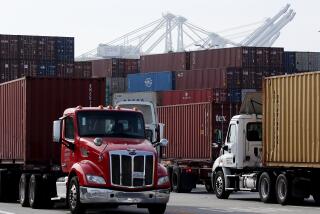Mexico Truck Access Facing Senate Hurdle
WASHINGTON â President Bushâs plan to permit Mexican trucks throughout the United States, already dealt a setback in the House, appears headed for a bumpy ride in the Senate.
A Senate panel today is expected to approve a measure designed to turn up the pressure on the administration to take stronger steps to ensure the safety of Mexican freight haulers before they gain unfettered access to U.S. roads.
Sen. Patty Murray (D-Wash.), chairwoman of the Senate transportation appropriations subcommittee, will press for approval of a measure that would, among other provisions, dispatch officials to Mexico to conduct a âsafety auditâ of each Mexican trucking firm before its vehicles were allowed to operate throughout the United States.
Her amendment would prohibit full opening of the border until the Transportation Departmentâs inspector general certified that Mexican drivers had valid licenses and limited their hours behind the wheel without rest. The amendment would add more than $100 million to the annual transportation appropriation bill to beef up border inspections.
Murrayâs measure, expected to be approved by the Democratic-controlled Senate, follows a vote by the Republican-run House last month that caught the Bush administration by surprise. That vote, to prohibit U.S. officials from processing applications for Mexican trucks to operate throughout the United States, intensified a debate over a provision of the North American Free Trade Agreement at a time when Bush is working to improve relations with Mexico.
Administration officials hope to satisfy lawmakersâ safety concerns before House and Senate negotiators meet to reconcile differences in the bills. Although Bush may veto the measure, a no-confidence vote by both houses of Congress--including 82 House Republicans who sided with union-friendly Democrats--is likely to put pressure on the administration to rethink its plan for permitting Mexican trucks throughout the United States beginning in January.
A White House spokeswoman said the administration has âsome serious concernsâ about the feasibility of some of Murrayâs proposals. However, the White House sent a letter to Senate leaders Wednesday expressing a willingness âto work with Congress to strengthen the safety enforcement regime applicable to Mexican motor carriers.â But the letter noted that âif legislation preventing NAFTA motor carriers access were presented to the president, his senior advisors would recommend that he veto the bill.â
One possible compromise, suggested by an association representing truck inspectors, is for U.S. inspectors to perform safety checks on a sampling of carriers before the trucks are permitted to travel throughout the United States.
âWe really believe they can meet all of the U.S. safety requirements and operate here safely,â said Stephen F. Campbell, executive director of the Commercial Vehicle Safety Alliance, which represents U.S., Mexican and Canadian safety inspectors. âBut it would be nice to be able to verify that.â
The American Trucking Assns., contending that the administrationâs plan would require Mexican truckers to provide more information than their Canadian counterparts, has written senators expressing concern that the House action âviolates our international obligations, threatens our trading relationship with Mexico and sends a troubling message about the dual treatment of our closest neighbors and largest trading partners.â
Currently, Mexican trucks are confined to a roughly 20-mile zone north of the border, beyond which goods must be transferred to U.S. rigs. A NAFTA arbitration panel ruled earlier this year that the United States is violating the treaty by arbitrarily denying access to Mexican trucks.
Of 46,144 Mexican trucks inspected at the border in fiscal 2000, 36% were ordered off the roads because of safety violations, compared with 24% of U.S. trucks, federal officials said.
California has the most aggressive inspection program of the border states.
More to Read
Sign up for Essential California
The most important California stories and recommendations in your inbox every morning.
You may occasionally receive promotional content from the Los Angeles Times.











